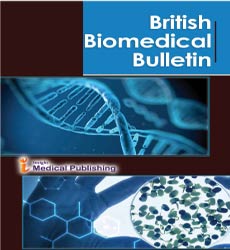ISSN : 2347-5447
British Biomedical Bulletin
Fluid Intake Management in Heart Failure: A Systematic Review of Liberal versus Restricted Intake
Dong Cheng*
1Department of Internal Medicine, Chang Gung University College of Medicine, Taoyuan, Taiwan
- *Corresponding Author:
- Dong Cheng,
Department of Internal Medicine, Chang Gung University College of Medicine, Taoyuan, Taiwan
E-mail: chedong@cgu.tw
Received date: November 12, 2024, Manuscript No. IPBBB-24-20035; Editor assigned date: November 14, 2024, PreQC No. IPBBB-24-20035 (PQ); Reviewed date: November 28, 2024, QC No. IPBBB-24-20035; Revised date: December 05, 2024, Manuscript No. IPBBB-24-20035 (R); Published date: December 12, 2024, DOI: 10.36648/2347-5447.12.4.72
Citation: Cheng D (2024) Fluid Intake Management in Heart Failure: A Systematic Review of Liberal versus Restricted Intake. Br Biomed Bull Vol.12 No.4: 72.
Description
Heart Failure (HF) is a long-lasting and incapacitating condition that greatly affects patients' lives. It is linked to frequent hospitalizations, a diminished quality of life and a higher risk of being re-hospitalized and mortality. In instances where cardiac output falls short, patients frequently experience elevated plasma osmolality, which leads to sodium and fluid retention. This causes volume overload, resulting in symptoms such as dyspnea due to the accumulation of fluid in the lungs. Consequently, fluid restriction and diuretic therapy are often advised to manage these symptoms and reduce the burden on the heart. The inquiry regarding the ideal fluid intake for heart failure patients remains a topic of ongoing investigation and controversy. Current guidelines recommend capping daily fluid intake to 1. 5-2 lir, especially in those with severe hyponatremia, to relieve congestion and mitigate symptoms. Nevertheless, it is essential to involve patients in conversations about the advantages and possible drawbacks of fluid restriction as part of their overall treatment strategy. Regardless of its widespread application, strict fluid restriction may not yield considerable benefits for every heart failure patient. Multiple studies have indicated that fluid restriction does not result in enhanced clinical outcomes or diminish the necessity for diuretics. Furthermore, patients with advanced heart failure face a greater risk of malnutrition and cachexia, complicating their management further. While managing heart failure frequently emphasizes sodium and fluid restriction, the risks related to malnutrition must be acknowledged, particularly in those who are most susceptible to these complications.
Antidiuretic hormone
One of the rami ications of luid restriction and diuretic usage in heart failure is a rise in osmotic pressure in the plasma. This, consequently, prompts the release of Antidiuretic Hormone (ADH) and heightens the feeling of thirst. Thirst is a prevalent and bothersome symptom for many heart failure patients, o ten resulting in anxiety, challenges in regulating daily luid intake and an adverse effect on their quality of life. Randomized controlled trials examining the consequences of aggressive fluid restriction have not consistently shown enhancements in symptoms or prognosis. In fact, these trials frequently reveal that while thirst may be heightened, luid restriction does not automatically translate to improved clinical outcomes. Additionally, in patients suffering from decompensated Heart Failure with preserved Ejection Fraction (HFpEF), the evidence does not advocate signi icant symptomatic improvements or clinical advantages from stringent luid restriction. This study aspires to conduct a systematic literature review to evaluate the effects of ad libitum luid intake versus restricted luid intake in adults with heart failure. The review will encompass a subgroup analysis emphasizing the implications of sodium restriction and will utilize trial sequential analysis to derive trustworthy conclusions from the data.
Heart failure
The systematic review follows the PRISMA (Preferred Reporting Items for Systematic Reviews and Meta-Analyses) guidelines to evaluate the impact of luid intake management on clinical outcomes in patients with Heart Failure (HF). This review aims to address the ongoing debate regarding optimal luid balance strategies in HF management. Despite advancements in HF care, there is a lack of consensus on luid intake approaches. Some studies suggest that liberal luid consumption may offer certain bene its, while others advocate for luid restriction, o ten in combination with sodium limitation. To provide clarity, the review examines the effects of both unrestricted and restricted luid intakes on clinical outcomes in adults with HF. A comprehensive search strategy was employed across ive major electronic databases, ensuring a robust collection of relevant studies. The search included terms related to HF, luid intake and sodium restriction to capture a wide range of perspectives. By synthesizing evidence from these studies, the review seeks to elucidate the potential bene its and drawbacks of varying luid management strategies in HF care. This systematic review is significant for guiding clinical practice and informing future research on luid balance in HF. By adhering to PRISMA guidelines, it ensures methodological rigor, enhancing the reliability of its indings for improving patient outcomes.
Open Access Journals
- Aquaculture & Veterinary Science
- Chemistry & Chemical Sciences
- Clinical Sciences
- Engineering
- General Science
- Genetics & Molecular Biology
- Health Care & Nursing
- Immunology & Microbiology
- Materials Science
- Mathematics & Physics
- Medical Sciences
- Neurology & Psychiatry
- Oncology & Cancer Science
- Pharmaceutical Sciences
